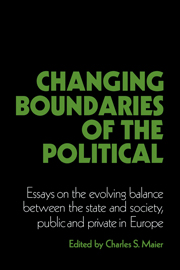 Changing Boundaries of the Political
Changing Boundaries of the Political Book contents
- Frontmatter
- Contents
- List of contributors
- Acknowledgments
- Introduction
- Part I Re-forming the political
- 1 Politics unbound
- 2 Challenging the boundaries of institutional politics: social movements since the 1960s
- 3 Religious transformation and the future of politics
- 4 The politics of time: changing paradigms of collective time and private time in the modern era
- Part II Changing boundaries of political activity
- Part III Uncertain boundaries for political economy
- Index
3 - Religious transformation and the future of politics
Published online by Cambridge University Press: 05 June 2012
- Frontmatter
- Contents
- List of contributors
- Acknowledgments
- Introduction
- Part I Re-forming the political
- 1 Politics unbound
- 2 Challenging the boundaries of institutional politics: social movements since the 1960s
- 3 Religious transformation and the future of politics
- 4 The politics of time: changing paradigms of collective time and private time in the modern era
- Part II Changing boundaries of political activity
- Part III Uncertain boundaries for political economy
- Index
Summary
Over the past three decades in Western Europe, the Catholic church, a bulwark of social and political order, has developed the cracks and fissures of advanced decay. Complex networks of values, beliefs, practices, and organizations built up by the church over centuries are disintegrating. In France where the dimensions of religious change have been the most striking, weekly mass attendance dropped from about one-third of all Catholics in the 1950s to about 15 percent at the end of the seventies. The numbers of those taking confession, communion, and confirmation fell. Ordinations declined from over 600 a year to about 150 between the mid-sixties and mid-seventies. Surveys of the faithful find growing pockets of doubt and resistance to central tenets of doctrine. The subcultural institutions which sheltered the Catholic community from the onslaught of secular culture and from the Republic are in ruin. Catholic Action associations, among the largest mass movements of the postwar period, have become sects with small audiences beyond the immediate participants.
These phenomena appear in all Catholic Western Europe, more advanced in France, the Netherlands, and Germany than in Spain, Italy, or Portugal; but everywhere the trends seem to move in the same directions. There are, to be sure, countertendencies: an upsurge of charismatic religious practice, some revival of monastic recruitment, continued mass support for private – that is, Catholic – schools, the success of new styles of Catholic politics, particularly in the Italian Comunione e Liberazione movement. The dominant fact, however, is the collapse of old patterns of religious practice and of long-established religious institutions.
- Type
- Chapter
- Information
- Changing Boundaries of the PoliticalEssays on the Evolving Balance between the State and Society, Public and Private in Europe, pp. 107 - 150Publisher: Cambridge University PressPrint publication year: 1987
- 8
- Cited by


